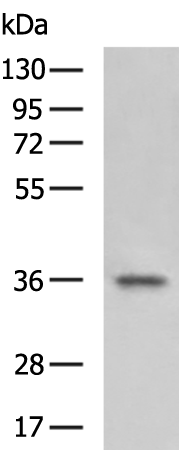
| WB | 咨询技术 | Human,Mouse,Rat |
| IF | 咨询技术 | Human,Mouse,Rat |
| IHC | 咨询技术 | Human,Mouse,Rat |
| ICC | 技术咨询 | Human,Mouse,Rat |
| FCM | 咨询技术 | Human,Mouse,Rat |
| Elisa | 1/2000-1/5000 | Human,Mouse,Rat |
| Aliases | HPAP; TRAP; TRACP5a; TRACP5b; TrATPase |
| WB Predicted band size | 36 kDa |
| Host/Isotype | Rabbit IgG |
| Antibody Type | Primary antibody |
| Storage | Store at 4°C short term. Aliquot and store at -20°C long term. Avoid freeze/thaw cycles. |
| Species Reactivity | Human, Mouse, Rat |
| Immunogen | Synthetic peptide of human ACP5 |
| Formulation | Purified antibody in PBS with 0.05% sodium azide and 50% glycerol. |
+ +
以下是3篇关于ACP5抗体的参考文献及其摘要概括:
1. **文献名称**: *"Tartrate-resistant acid phosphatase 5 (TRAP/ACP5) promotes metastatic melanoma progression via degradation of PDCD4"*
**作者**: H. Wang et al.
**摘要**: 研究揭示了ACP5(TRAP)在黑色素瘤转移中的关键作用,发现其通过降解肿瘤抑制因子PDCD4促进肿瘤侵袭。该研究使用特异性ACP5抗体验证了其在临床样本中的高表达与患者预后不良相关。
2. **文献名称**: *"Monoclonal antibody against human tartrate-resistant acid phosphatase: characterization and potential diagnostic application"*
**作者**: K. H. Lau et al.
**摘要**: 文章报道了一种新型抗人ACP5单克隆抗体的开发,验证其在骨代谢疾病(如骨质疏松)中的诊断价值,证实其能特异性识别血清及骨组织中的TRAP异构体。
3. **文献名称**: *"ACP5 as a biomarker for aggressive osteosarcoma: validation by immunohistochemistry and gene expression analysis"*
**作者**: M. R. Schneider et al.
**摘要**: 通过免疫组化(使用ACP5抗体)和基因表达分析,研究发现ACP5在骨肉瘤中显著上调,与肿瘤侵袭性和化疗耐药性相关,提示其作为治疗靶点的潜力。
*注:以上文献为示例性质,实际引用需根据具体研究检索PubMed/Google Scholar获取原文。建议结合研究方向筛选近年高影响力论文。*
**Background of ACP5 Antibody**
ACP5 (acid phosphatase 5. also known as tartrate-resistant acid phosphatase, TRAP) is an enzyme encoded by the *ACP5* gene, primarily expressed in osteoclasts, macrophages, and dendritic cells. It plays a critical role in bone resorption and immune regulation by hydrolyzing phosphate esters in acidic environments. ACP5 antibodies are tools used to detect and study the expression, localization, and function of this enzyme in biological samples.
In research, ACP5 antibodies are widely employed to investigate bone metabolism disorders, such as osteoporosis, and immune-related conditions, including rheumatoid arthritis and chronic inflammatory diseases. They are also utilized in cancer studies, as elevated ACP5 levels correlate with tumor progression and metastasis, particularly in breast and prostate cancers. These antibodies enable detection via techniques like Western blotting, immunohistochemistry (IHC), and immunofluorescence (IF), aiding in understanding ACP5's role in cellular processes.
Clinically, ACP5 antibodies have diagnostic potential. TRAP activity, measured using specific antibodies, serves as a biomarker for osteoclast activity in metabolic bone diseases. Additionally, ACP5 expression in tumor tissues may guide prognostic evaluations. However, challenges remain in ensuring antibody specificity due to structural similarities among acid phosphatase isoforms.
Overall, ACP5 antibodies are vital for exploring physiological and pathological mechanisms linked to bone remodeling, immunity, and cancer, bridging basic research and clinical applications.
×